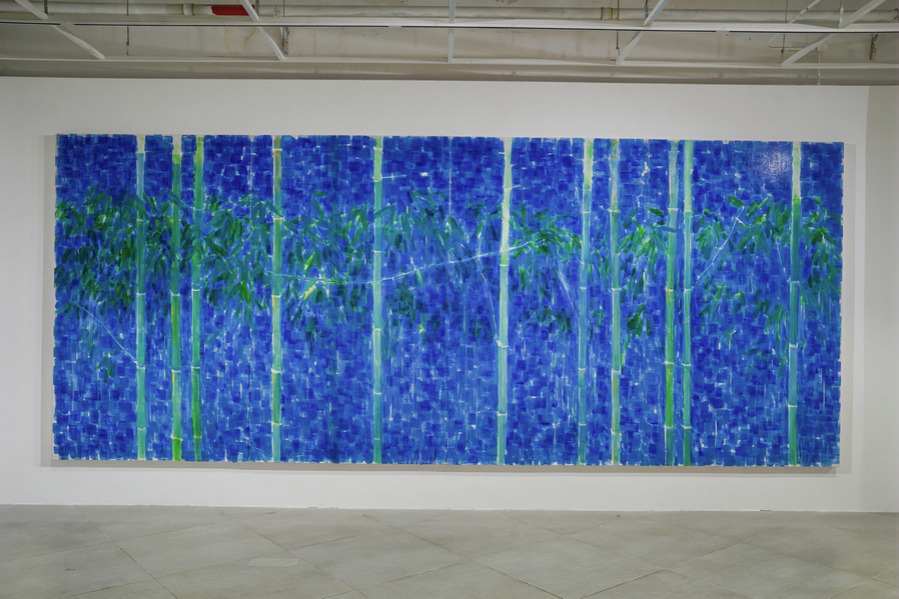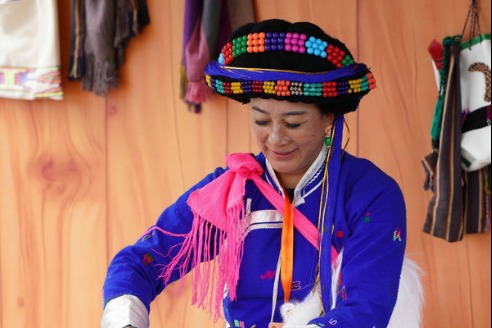Archives give voice to immigrants


Tales of UK capital's pioneering Chinese residents highlighted in exhibition, Julian Shea reports in London.
London's document repository, the London Metropolitan Archives, has shone a light on previously little-known information about the city's first Chinese residents as part of an exhibition about the historical roots of the capital's earliest immigrant communities.
The Unforgotten Lives exhibition runs until March 2024 at the archive, or LMA, which is owned by the City of London Corp and preserves the documentary history of London as a free public resource.
In its own words, the exhibition aims to "present the stories of Londoners of African, Caribbean, Asian and Indigenous heritage who lived and worked in the city between 1560 and 1860", and while long-standing historical links to Africa and India mean such communities are prominent in London history, more surprising is the story told about the city's first residents from China.
Among the items on display are probate documents from 1815 relating to the legal estate of a Chinese sailor called Assing, signed in Chinese characters, and details of John Anthony, who in 1805 was the first Chinese person to become a naturalized British citizen, who achieved such success in life that his funeral drew a crowd of 2,000 mourners and his obituary was published in The Gentleman's Magazine, where he was described as having "accumulated a great fortune and bore a most excellent character".
Much of the archive work is done by volunteers, going through collections of documents from organizations, such as businesses, charities, schools, hospitals and parish records, piecing together and cross-referencing loose threads of information to bring long-dead characters back to life.
"A lot of records, from things like parishes or poor relief records, tend to say what was being done, but not much about the individuals involved, so we're trying to tease out voices and personal experiences," explains the LMA's head of digital services, Laurence Ward.
"We've been working on something called the Switching the Lens project, trying to identify traces of communities in a time when very often things like people's backgrounds or heritages weren't mentioned in records, so it takes a lot of digging, but we're aiming to build a more accurate picture of society in years gone by."
One of the pictures in the exhibition shows that the elaborately titled "Strangers' Home for natives of India, Arabia, Africa, China, the Straits of Malacca, the Mozambique, and the Islands of the South Pacific, who may require them during their temporary sojourn in London", opened in 1856 in the Limehouse region of London, which was home to the city's original Chinatown.
"The census of 1851 shows a shelter with 29 men living there, and several of them have their birthplace listed as China, so this building is important because, for the first time, there's something formal being created for the welfare of stranded sailors waiting for a passage back," says senior archivist, Howard Doble. "This is the first acknowledgment that the welfare of these people needs looking after."
Although the picture focuses on the architecture of the building, it is notable that the figures walking in front of it wear a mix of traditional British clothing, and what are very obviously non-European costumes, hinting at who was inside the building.
Nautical connection
Unsurprisingly, given the importance of the sea for travel, the nautical world plays a major role in the earliest traces of Chinese life in Britain.
The nature of archive research is such that often long periods of frustration are sometimes punctuated by the discovery of a loose thread which, when pulled, leads to greater things, and this is certainly the case in the story of Assing, a captain's cook on a ship called the Thomas Grenville, run by the East India Company.
When he died, his probate documents were signed by someone called John Owing, who described himself as Assing's cousin, and who wrote his name on the legal papers in Chinese characters.
Whether he was a blood relative or just someone who put himself forward as such is unclear, but Owing also provides a direct link to one of the biggest names in the early history of the Chinese community in Britain — John Anthony.
"In Assing's probate, Owing mentioned living at Gole's Chinese barracks, a lodging place for Chinese sailors run by someone called Abraham Gole. His brother-in-law was John Anthony, who had obviously changed his name, and was very successful selling nautical clothing, possibly to the East India Company, and by a private act of Parliament, he became the first naturalized Briton from China," says Doble.
"The write-up of Anthony's funeral mentions that he owned multiple properties across London, so, evidently, he had done well for himself, and although it was a Christian burial, the report notes that his cortege was preceded by four Chinese men 'dressed in white, being the mourning of their country'. He was clearly a very significant individual."
Anthony's name also crops up in 1804, acting as an interpreter at London's Old Bailey court for a Chinese man known as Erpoon, revealing more details of social attitudes of the time that might surprise modern day observers.
"In the buildup, the court transcript tells us lots about Anthony's background, but most interestingly, when speaking to the court, he says how in China anyone taking an oath does so by breaking a cup, so before Erpoon gives evidence, the court agrees to this, and that is how it was done in a British court over 200 years ago," says Doble.
"Elsewhere in the court records, there's also an amazing story from 1765, where a case was postponed for two months while the court searched for a copy of the Quran for a Muslim male to swear on. The man is on record as being employed by the governor of Madras to look after his cheetahs, which went on to become part of the menagerie at the Tower of London."





































